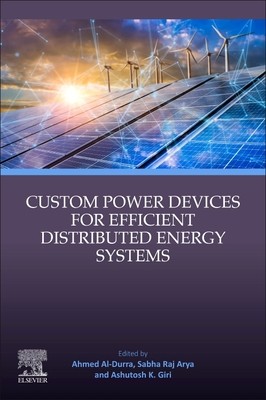
- We will send in 10–14 business days.
- Publisher: Elsevier
- ISBN-10: 0443214913
- ISBN-13: 9780443214912
- Format: 15.2 x 22.9 x 1.7 cm, minkšti viršeliai
- Language: English
- SAVE -10% with code: EXTRA
Custom Power Devices for Efficient Distributed Energy Systems (e-book) (used book) | bookbook.eu
Reviews
Description
Custom Power Devices for Efficient Distributed Energy Systems presents a range of novel ideas and concepts based on renewable energy-fed power generation and control, offering avenues to efficient utilization and improved power quality, and addressing power quality issues such as harmonics compensation, supply current balancing, and neutral current compensation.
The book begins by introducing distributed power systems within the global renewable energy context, reviewing different types of renewable energy sources and distributed power generation systems, and detailing custom power device design and modelling. This is followed by individual chapters providing in-depth coverage of specific techniques and applications, with insights into various topologies, as well as control algorithms, used for power control in a range of distributed energy conversion systems, such as solar, wind, hydro, and other power sources. Finally, power quality issues in renewable energy distributed generation are discussed and addressed in detail.
This is a valuable resource of researchers, faculty, and advanced students with an interest in power generation systems, renewable energy, and power systems engineering, as well as practicing engineers, R&D professionals, managers, and other industry personnel in the renewable energy sector.
EXTRA 10 % discount with code: EXTRA
The promotion ends in 21d.06:29:11
The discount code is valid when purchasing from 10 €. Discounts do not stack.
- Publisher: Elsevier
- ISBN-10: 0443214913
- ISBN-13: 9780443214912
- Format: 15.2 x 22.9 x 1.7 cm, minkšti viršeliai
- Language: English English
Custom Power Devices for Efficient Distributed Energy Systems presents a range of novel ideas and concepts based on renewable energy-fed power generation and control, offering avenues to efficient utilization and improved power quality, and addressing power quality issues such as harmonics compensation, supply current balancing, and neutral current compensation.
The book begins by introducing distributed power systems within the global renewable energy context, reviewing different types of renewable energy sources and distributed power generation systems, and detailing custom power device design and modelling. This is followed by individual chapters providing in-depth coverage of specific techniques and applications, with insights into various topologies, as well as control algorithms, used for power control in a range of distributed energy conversion systems, such as solar, wind, hydro, and other power sources. Finally, power quality issues in renewable energy distributed generation are discussed and addressed in detail.
This is a valuable resource of researchers, faculty, and advanced students with an interest in power generation systems, renewable energy, and power systems engineering, as well as practicing engineers, R&D professionals, managers, and other industry personnel in the renewable energy sector.


Reviews